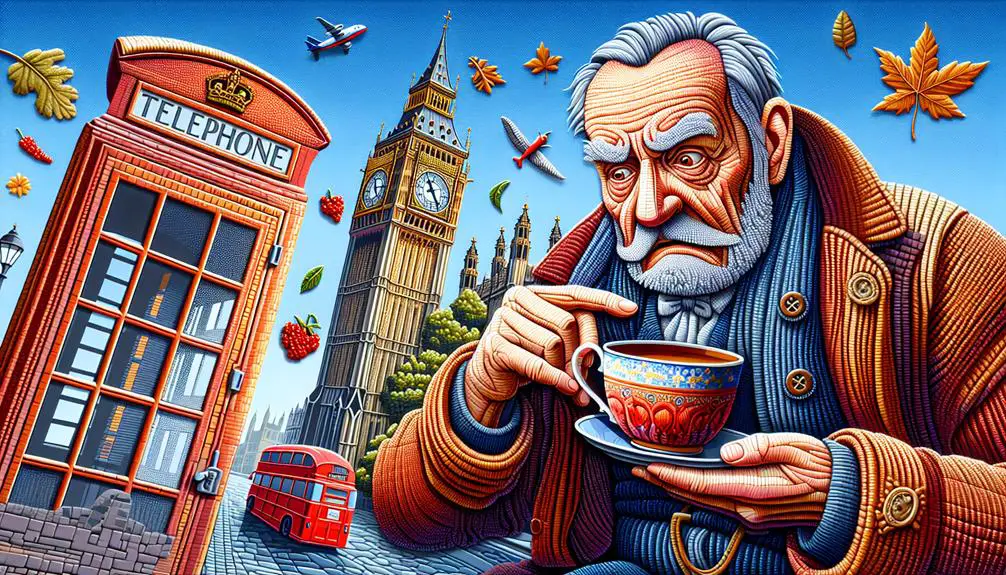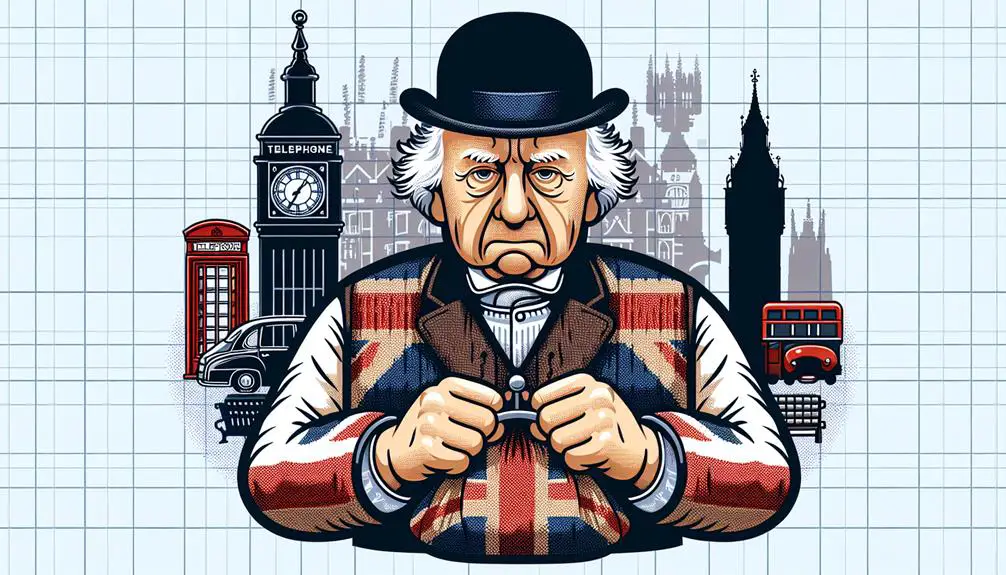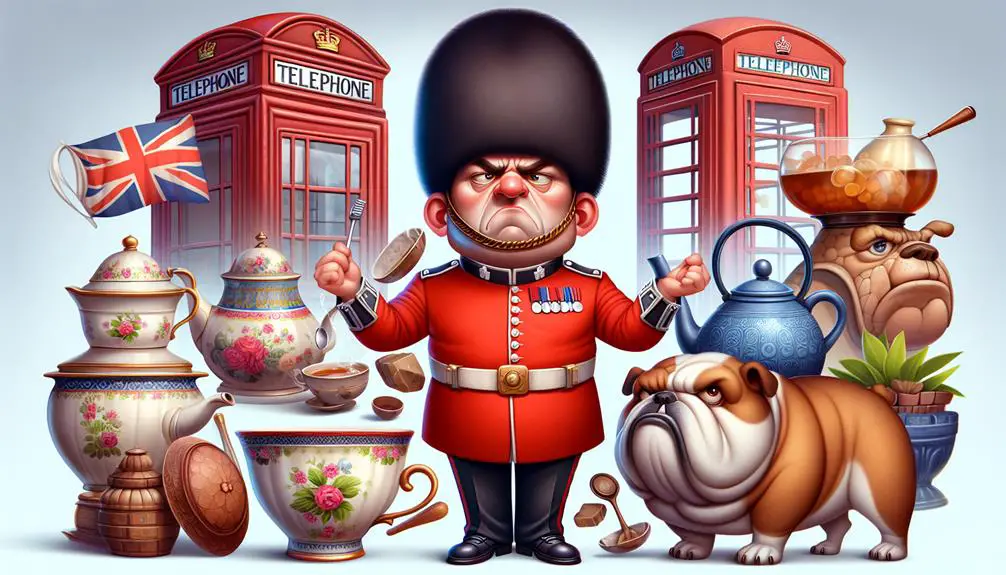Imagine you've just overheard someone being called a 'git' in a bustling London pub. This term, a classic piece of British slang for a mean or foolish person, might have caught your attention.
You're now curious about the colorful array of epithets the British have for those who rub them the wrong way. From the sneaky 'snake' to the grumpy 'miser,' and not forgetting the arrogant 'tosser' or the infamous 'muppet,' there's a rich tapestry of language to explore.
Each term carries its own nuances and stories, beckoning you to unravel the social and cultural threads that weave them into everyday British conversation.
The Classic "Git

In British slang, 'git' is a pejorative term often used to describe an unpleasant or contemptible person, embodying a blend of rudeness and ineptitude. This term, etymologically rooted in the mid-20th century, carries a complex connotation that extends beyond mere unpleasantness to encapsulate a specific brand of irksome behavior. You'll find its usage prevalent in various contexts, from casual conversations to literary compositions, indicating its widespread acceptance and versatility within the British lexicon.
Analyzing 'git' in a socio-linguistic framework, you'll notice it conveys more than an individual's disagreeable nature. It also subtly references the person's lack of competence or intelligence, painting a comprehensive picture of someone not only socially repulsive but also fundamentally lacking in utility or sense. This dual implication enriches the term's application, allowing it to succinctly communicate a nuanced judgment that other insults might require more words to express.
Interestingly, while 'git' is undeniably derogatory, its severity can fluctuate based on context and intonation. In some instances, it's employed in a somewhat affectionate manner, where the underlying criticism is tempered by a tone of endearment or familiarity. This adaptability showcases the term's linguistic elasticity, enabling it to straddle the lines between insult and banter.
Conclusively, 'git' serves as a fascinating study in the dynamics of language and social interaction. Its ability to encapsulate complex character judgments within a single syllable demonstrates the power and economy of slang. As a lexical artifact, 'git' offers invaluable insights into British cultural attitudes towards incompetence and social behavior, reflecting broader societal values and norms.
Sneaky "Snake
Building on our exploration of 'git', let's now turn our attention to another quintessentially British slang term: 'snake', a label that conveys deceit and cunning with a sharpness that's both precise and evocative.
When you're called a 'snake' in British slang, it's far from a compliment. This term, steeped in cultural connotations and history, paints a picture of someone who's not just untrustworthy, but also skilled in manipulation and betrayal.
Understanding 'snake' requires dissecting its usage and implications:
- Historical Roots: The term draws on the long-standing association of snakes with treachery, dating back to biblical times. This historical context enriches the term, imbuing it with a depth of betrayal that transcends mere dishonesty.
- Social Implications: Being branded a 'snake' can have significant social repercussions. It suggests a calculated, rather than impulsive, approach to deceit, marking the accused as someone to be wary of in personal and professional circles.
- Cultural Variance: While 'snake' is understood across the English-speaking world, its resonance within British culture is particularly strong. It taps into a rich vein of British idioms and expressions that prioritize wit and verbal dexterity.
In analyzing 'snake', it's clear that the term is more than just an insult; it's a nuanced critique of character. It doesn't merely accuse someone of dishonesty; it highlights a methodical, almost artful approach to deceit. This understanding allows you to appreciate the term's complexity and the weight it carries in British discourse.
Grumpy "Miser

ARTICLE TITLE: Mean Person British Slang
PREVIOUS SUBTOPIC: 'Sneaky 'Snake'
CURRENT SUBTOPIC: 'Grumpy 'Miser'
Delving into another facet of British slang, we encounter 'miser', a term that paints a vivid picture of someone whose grumpiness is deeply intertwined with their extreme reluctance to spend money or share resources. This term not only encapsulates the essence of frugality but also carries connotations of a sour disposition, often resulting in a portrayal that is both fascinating and somewhat pitiable in British cultural discourse.
To fully appreciate the nuance of 'miser' within the context of British slang, consider the following table that compares and contrasts key aspects with related terms:
| Term | Connotation | Cultural Context |
|---|---|---|
| Miser | Negative, stingy | Often depicted as grumpy, hoarding wealth |
| Scrooge | Extremely miserly | Popularised by Dickens, embodies a transformation journey |
| Tightwad | Similar to miser | Less emphasis on grumpiness, more on tightfistedness |
| Penny-pincher | Mildly negative | Focuses on excessive thriftiness without the grumpy aspect |
| Cheapskate | Disparaging | Implies both stinginess and a lack of generosity |
The term 'miser' thus stands out for its emphasis on both the emotional temperament and the financial behavior of the individual. It's a word that conveys more than just an aversion to spending; it suggests a deeper personality trait, one that intertwines parsimony with a general disposition towards grumpiness. This dual focus is what makes 'miser' particularly resonant in British slang, offering insights into attitudes toward wealth, generosity, and social interaction within the culture.
Arrogant "Tosser
Moving from the realm of stinginess to that of arrogance, you'll find that the British slang term 'tosser' vividly encapsulates disdain for those perceived as overly self-important. Unlike other insults, which might focus on specific behaviors or actions, 'tosser' is a broad denunciation of someone's character, suggesting not just arrogance, but a blend of ignorance and self-absorption that makes the person particularly grating to others.
The term's effectiveness and popularity in conveying contempt for arrogance can be attributed to several factors:
- Universality: 'Tosser' is understood across various regions of the UK, making it a versatile tool in the arsenal of British slang. Its widespread recognition ensures that the insult carries weight regardless of the specific locale.
- Ambiguity: While the term has a clear negative connotation, its exact meaning can be nebulous, allowing the speaker to imply a range of arrogant behaviors without being explicit. This ambiguity gives 'tosser' a certain power, as the accused is left to wonder about the exact nature of their perceived arrogance.
- Social Context: The use of 'tosser' often reflects broader social dynamics, including a disdain for those who flaunt their perceived superiority. It's a linguistic pushback against arrogance that seeks to deflate the ego of the person being criticized.
In an academic analysis of British slang, 'tosser' emerges as a term that isn't merely an insult but a social corrective, a means of expressing collective disdain for arrogance. Its usage underscores the values of humility and self-awareness, positioning arrogance as a trait unworthy of respect.
The Infamous "Muppet

ARTICLE TITLE: Mean Person British Slang
PREVIOUS SUBTOPIC: 'Arrogant 'Tosser'
CURRENT SUBTOPIC: 'The Infamous 'Muppet'
One cannot explore British slang without encountering the term 'muppet,' a multifaceted insult that delves deep into perceptions of foolishness and incompetence. You'll find that it's a word rich in connotations, often employed to describe someone acting in a way that defies common sense or displays a lack of awareness about their surroundings or the task at hand.
The term 'muppet' serves as a light-hearted yet disparaging way to call attention to someone's blunder or to label someone who consistently makes poor decisions. It implies a level of endearment in its use, distinguishing it from harsher insults. This nuance is critical in understanding its place within British slang, where context and relationship between speaker and subject dictate the term's impact.
| Aspect | Description | Example Context |
|---|---|---|
| Origin | Derived from the puppet characters, indicating a lack of autonomy or intelligence. | "Acting like a right muppet, aren't you?" |
| Usage Context | Light-hearted ridicule among friends or colleagues. | "Stop being a muppet and pay attention." |
| Implications | Suggests incompetence or foolishness without malice. | "He's a bit of a muppet, but harmless." |
| Relationship | Often used where there is a familiarity or affection. | "Only a true friend can call you a muppet and get away with it." |
In analyzing 'muppet,' you uncover a layer of British culture that values humor and indirect criticism, highlighting a preference for maintaining social harmony even when addressing someone's faults.
Frequently Asked Questions
How Has the Portrayal of Mean Characters in British Literature Influenced the Development of These Slang Terms?
You've seen how British literature's depiction of mean characters shapes slang development. It's fascinating how authors' portrayals contribute significantly, embedding these terms deeply into language, reflecting societal attitudes and behaviors over time.
Can These Slang Terms Be Traced Back to Any Specific Regions or Dialects Within the Uk?
You might wonder if regional dialects have given birth to specific terms. Indeed, many of these expressions can be traced back to distinct areas within the UK, showcasing the rich linguistic diversity found across the region.
Are There Any Notable Differences in How These Terms Are Perceived or Used Across Different Age Groups Within British Society?
Absolutely, you'll find that perceptions and usage of slang vary significantly across age groups. Younger generations might embrace these terms more freely, while older individuals often view them with skepticism or outright disapproval.
How Have British Media and Television Shows Contributed to the International Understanding and Usage of These Slang Terms?
British media and TV have painted vivid pictures, making slang universally recognizable. They've dissected nuances, influencing global dialogue and understanding. Your grasp of these terms likely stems from such broadcasts, illustrating their pervasive educational impact.
What Role Do These Slang Terms Play in the Dynamics of British Humor, Especially in the Context of Self-Deprecation and Irony?
These slang terms enhance British humor's unique charm, especially in self-deprecation and irony. They offer a nuanced way to navigate social dynamics, subtly critiquing yet bonding, showcasing a clever, inclusive approach to comedy.
Conclusion
In conclusion, the rich tapestry of British slang presents a linguistic playground, where terms like 'git', 'snake', 'miser', 'tosser', and 'muppet' paint vivid portraits of undesirable characters.
These labels, woven from the very fabric of British wit and disdain, offer more than mere insults; they serve as linguistic gems, encapsulating complex personalities in a single word.
It's as if each term is a brushstroke in an elaborate painting, contributing to a larger, more colorful depiction of human nature.







